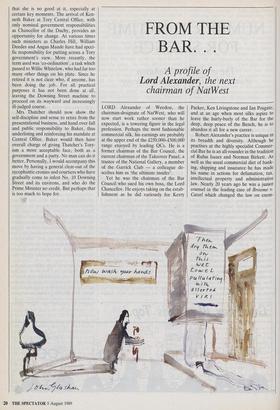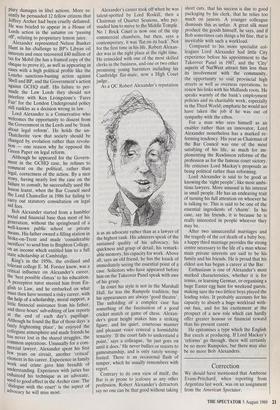FROM THE BAR.. .
A profile of
Lord Alexander, the next
chairman of NatWest
LORD Alexander of Weedon, the chairman-designate of NatWest, who will now start work rather sooner than he expected, is a towering figure in the legal profession. Perhaps the most fashionable commercial silk, his earnings are probably at the upper end of the L250,000–£500,000 range enjoyed by leading QCs. He is a former chairman of the Bar Council, the current chairman of the Takeover Panel, a trustee of the National Gallery, a member of the Garrick Club — a colleague de- scribes him as 'the ultimate insider'.
Yet he was the chairman of the Bar Council who sued his own boss, the Lord Chancellor. He enjoys taking on the estab- lishment as he did variously for Kerry
Packer, Ken Livingstone and Ian Posgate; and at an age when most silks aspire to leave the hurly-burly of the Bar for the deep, deep peace of the Bench, he is to abandon it all for a new career.
Robert Alexander's practice is unique in its breadth and diversity. Although he practises at the highly specialist Commer- cial Bar he is an all-rounder in the tradition of Rufus Isaacs and Norman Birkett. As well as the usual commercial diet of bank- ing, shipping and insurance he has made his name in actions for defamation, tax, intellectual property and administrative law. Nearly 20 years ago he was a junior counsel in the leading case of Broome v. Cassel which changed the law on exem-
glary damages in libel actions. More re- cently he persuaded 12 fellow citizens that Jeffrey Archer had been cruelly defamed. He was briefed to appear in a House of Lords action in the autumn on 'passing off', relating to proprietary lemon juice. Alexander represented Nelson Bunker Hunt in his challenge to BP's Libyan oil interests and once recovered £40 million of tax for Mobil (he has a framed copy of the cheque to prove it), as well as appearing in cases with a high political profile like the Lonrho sanctions-busting action against Shell and BP, and the Government's action against GCHQ staff. His failure to per- suade the Law Lords they should not interfere with Ken Livingstone's 'Fares Fair' for the London Underground policy still rankles as a decision wrong in law. Lord Alexander is a Conservative who welcomes the opportunity to dissent from the Government in the Lords and be 'frank about legal reform'. He holds the un- Thatcherite view that society should be changed by evolution rather than revolu- tion ____ one reason why he opposed the Green Paper on legal reform. Although he appeared for the Govern- ment in the GCHQ case, he refuses to comment on the political, rather than legal, correctness of the action. By a nice irony, having nearly lost the case on the failure to consult, he successfully used the lesson learnt, when the Bar Council sued the Lord Chancellor in 1986 for failing to carry out statutory consultation on legal aid fees.
Bob Alexander started from a humbler social and financial base than most of his generation, without the springboard of a well-known public school or private means. His father owned a filling station in Stoke-on-Trent and made 'considerable sacrifices' to send him to Brighton College, on an income which entitled him to a full state scholarship at Cambridge. King's in the 1950s, the civilised and tolerant college E. M. Forster knew, was a critical influence on Alexander's career, the 'best possible climax' to his education. A perceptive tutor steered him from En- glish to Law, and he embarked on what must then have seemed a risky career, with the help of a scholarship, moral support, a little financial assistance from his father, and three hours' sub-editing of law reports at the end of each day's pupillage. Although he found the Bar of those days 'a fairly frightening place', he enjoyed the
collegiate atmosphere and made friends he has never lost in the shared struggles, the common aspirations. Unusually for a com- mercial lawyer, Alexander spent his first few years on circuit, another 'critical' element in his career. Experience in family work and crime gave him breadth of understanding. Experience with juries has enhanced his technique as an advocate, used to good effect in the Archer case. The dialogue with the court' is the aspect of advocacy he will miss most.
Alexander's career took off when he was talent-spotted by Lord Roskill, then a Chairman of Quarter Sessions, who per- suaded him to move to the Middle Temple. No 1 Brick Court is now one of the top commercial chambers, but then, says a contemporary, it was 'flat on its back'. Not for the first time in his life, Robert Alexan- der was in the right place at the right time. He coincided with one of the most skilled clerks in the business, and one or two other promising young barristers including his Cambridge flat-mate, now a High Court judge. As a QC Robert Alexander's reputation is as an advocate rather than as a lawyer of the highest rank. His admirers speak of the sustained quality of his advocacy, his quickness and grasp of detail, his remark- able memory, his capacity for work. Above all, says an old friend, he has the knack of immediately seeing the essential point of a case. Solicitors who have appeared before him on the Takeover Panel speak with awe of his grasp. In court his style is not in the Marshall Hall, far less the Rumpole tradition, but his appearances are always 'good theatre'. The unfolding of a complex case has something of the fascination of a good cricket match or game of chess. Alexan- der's great height makes him a striking figure, and his quiet, courteous manner and pleasant voice conceal a formidable tenacity. 'If the court fails to understand a point,' says a colleague, 'he just goes on until it does.' He never bullies or resorts to gamesmanship, and is only rarely wrong- footed. There is an occasional flash of temper, which he usually remembers with regret. Contrary to its own view of itself, the Bar is as prone to jealousy as any other profession. Robert Alexander's detractors say no one can be that good without taking short cuts, that his success is due to good packaging by his clerk, that he relies too much on juniors. A younger colleague dismisses this as unfair. A great silk must produce the goods himself, he says, and if Bob sometimes cuts things a bit fine, that is inevitable with such a workload.
Compared to his more specialist col- leagues Lord Alexander had little City experience before his appointment to the Takeover Panel in 1987, and the 'City' aspects of NatWest attract him less than its involvement with the community, the opportunity to visit provincial high streets as well as overseas operations, to renew his links with his Midlands roots. He speaks warmly of the bank's employment policies and its charitable work, especially in the Third World; emphatic he would not have taken the job if he was out of sympathy with the ethos.
For a man who sees himself as an enabler rather than an innovator, Lord Alexander nonetheless has a marked re- forming tendency. His year as Chairman of the Bar Council was one of the most satisfying of his life, as much for im- plementing the Rawlinson reforms of the profession as for the famous court victory. He criticises Lord Mackay's proposals as being political rather than reforming.
Lord Alexander is said to be good at knowing the 'right people', like most ambi- tious lawyers. More unusual is his interest in small people. He has an endearing trait of turning his full attention on whoever he is talking to. This is said to be one of the essential ingredients of 'charm'. In his case, say his friends, it is because he is really interested in people whoever they may be.
After two unsuccessful marriages and the tragedy of the cot death of a baby boy, a happy third marriage provides the strong centre necessary to the life of a man whose main private interests are said to be his family and his friends. He is proud that his eldest son has begun a career at the Bar.
Enthusiasm is one of Alexander's most marked characteristics, whether it is for tennis, or learning German, or organising a huge Easter egg hunt for weekend guests, making sure the two littlest boys played the leading roles. It probably accounts for his capacity to absorb a huge workload with- out fuss, and for his excitement at the prospect of a new role which can hardly offer greater honour or financial reward than his present career.
He epitomises a type which the English Bar excels at producing. If Lord Mackay's `reforms' go through, there will certainly be no more Rumpoles, but there may also be no more Bob Alexanders.



















































 Previous page
Previous page